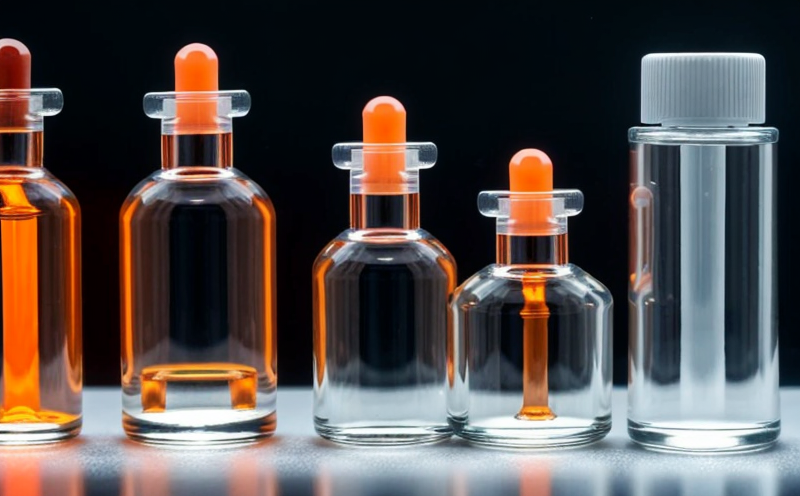ASTM G21 Antifungal Testing of Nanoparticles in Safety Assessments
The ASTM G21 standard is widely recognized as a cornerstone in nanotoxicology and safety assessments. This test focuses on evaluating the antifungal properties of nanoparticles, which are critical for understanding their potential risks to human health and the environment. The testing process ensures that products containing these nanoparticles meet regulatory standards, thus protecting public welfare.
ASTM G21 involves a series of controlled experiments designed to simulate real-world conditions under which nanoparticles might encounter microorganisms. This includes exposure scenarios where particles come into contact with various fungi species known for their resistance and adaptability in different environments. The testing protocol is stringent, ensuring that any potential adverse effects are identified early on.
One key aspect of ASTM G21 is its emphasis on reproducibility across laboratories. By adhering to this standard, manufacturers can ensure consistent results regardless of the facility conducting the tests. This consistency is crucial for regulatory compliance and stakeholder confidence. Additionally, it allows researchers to compare data more effectively, enhancing collaborative efforts in nanotechnology development.
The testing procedure typically begins with preparing a solution containing the nanoparticles at varying concentrations. These solutions are then exposed to different strains of fungi under controlled conditions that mimic typical usage scenarios. After an incubation period, observations are made regarding changes in fungal growth patterns or viability.
Instrumentational analysis plays a vital role during this process. Scanning electron microscopy (SEM) and transmission electron microscopy (TEM) provide detailed images showcasing nanoparticle morphology before and after exposure to fungi. In vitro assays further quantify the extent of antifungal activity by measuring inhibition zones around particles or direct counts of surviving fungal cells.
Acceptance criteria for ASTM G21 involve demonstrating minimal adverse impacts on target organisms while maintaining efficacy against intended pathogens. Compliance with these standards not only enhances product safety but also fosters trust among consumers and regulatory bodies alike.
In conclusion, ASTM G21 antifungal testing offers a robust framework for ensuring the safe integration of nanoparticles into consumer products. By following this rigorous protocol, manufacturers can mitigate risks associated with nanoparticle exposure while advancing technological innovations that benefit society as a whole.
Why Choose This Test
Selecting ASTM G21 antifungal testing for your nanomaterials is essential when aiming to comply with international standards and ensure product safety. Here are several compelling reasons why this test should be part of your quality assurance process:
- Regulatory Compliance: Many countries mandate compliance with certain ISO, ASTM, EN, or IEC guidelines for nanomaterials testing.
- Rigorous Methodology: The ASTM G21 protocol provides a standardized approach to evaluating nanoparticle interactions with fungi, ensuring consistent and reliable results across different laboratories.
- Predictive Insights: Understanding how nanoparticles behave in the presence of fungi helps predict their long-term environmental impact, guiding responsible product design.
- Enhanced Reputation: Demonstrating adherence to high-quality testing procedures can significantly bolster your brand's reputation among consumers and stakeholders.
- Innovation Support: By identifying potential issues early in development, ASTM G21 supports continuous improvement in nanotechnology applications.
- Competitive Edge: Proactively addressing safety concerns through rigorous testing sets you apart from competitors who may overlook these crucial aspects.
Choosing ASTM G21 ensures that your products not only meet regulatory requirements but also contribute positively to public health and environmental sustainability.
Quality and Reliability Assurance
Ensuring the quality and reliability of nanomaterials testing is paramount in maintaining trust with consumers and adhering to stringent international standards. At our laboratory, we employ state-of-the-art facilities and experienced professionals who specialize in conducting ASTM G21 tests.
We maintain strict adherence to ISO 9001 certification, which guarantees that all processes from sample preparation to final analysis are meticulously documented and reviewed. Our team uses advanced analytical techniques such as SEM, TEM, and in vitro assays to provide comprehensive data supporting our findings.
Our commitment extends beyond just meeting current standards; we continuously invest in research and development aimed at staying ahead of emerging trends within nanotoxicology. This proactive stance ensures that our testing methods remain relevant and effective against new challenges posed by rapidly advancing technologies.
To further enhance reliability, we participate actively in inter-laboratory comparisons organized by leading organizations like ASTM International. These exercises help identify areas for improvement and validate the accuracy of our results compared to industry peers.
In summary, selecting a laboratory that prioritizes quality assurance through rigorous adherence to international standards will provide you with peace of mind knowing your products are thoroughly evaluated before reaching market shelves.
Competitive Advantage and Market Impact
Conducting ASTM G21 antifungal testing offers several competitive advantages that can significantly impact your market position:
- Differentiation: Demonstrating compliance with this rigorous standard sets you apart from competitors who may not prioritize safety.
- Innovation Leadership: Proactively addressing potential risks through thorough testing positions your company as an innovator in nanotechnology.
- Customer Trust: Building trust among consumers and stakeholders is crucial for long-term success. ASTM G21 results can build this confidence.
- Regulatory Compliance: Ensuring that your products meet international standards helps avoid costly penalties and delays associated with non-compliance.
- Better Product Design
Incorporating insights gained from ASTM G21 testing into product design enhances overall performance, durability, and safety. This leads to improved customer satisfaction and increased market share.





